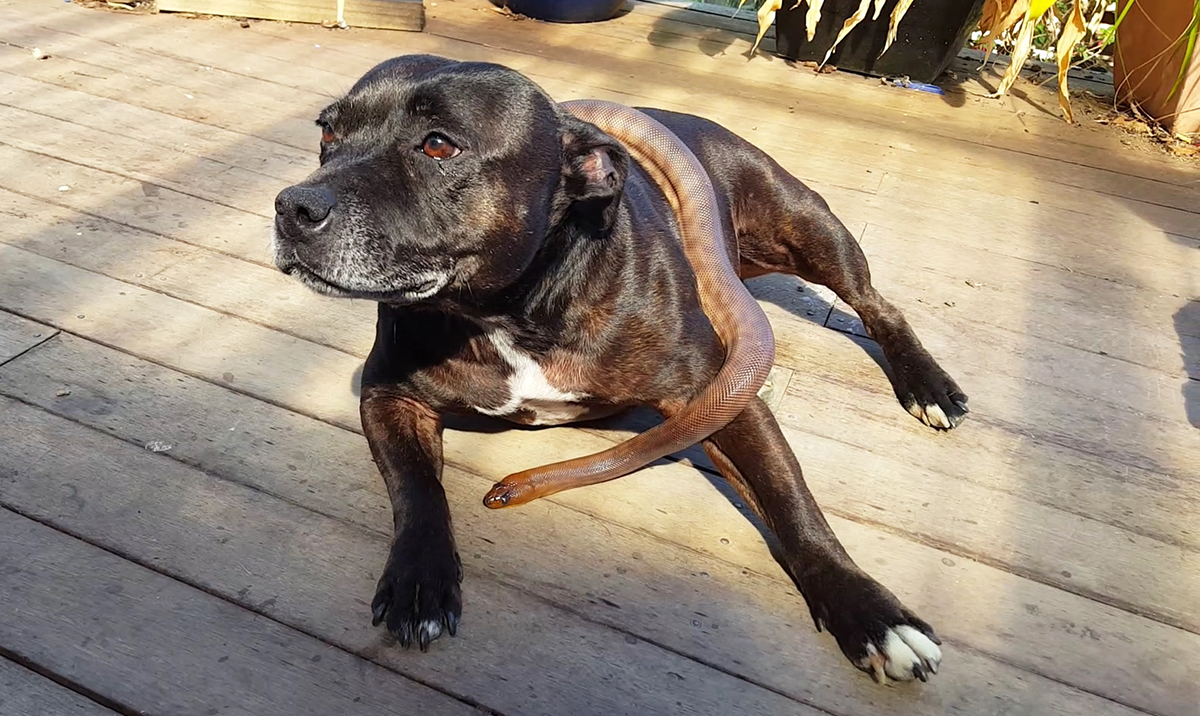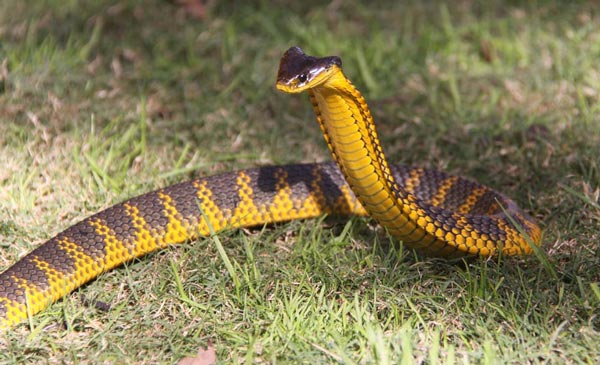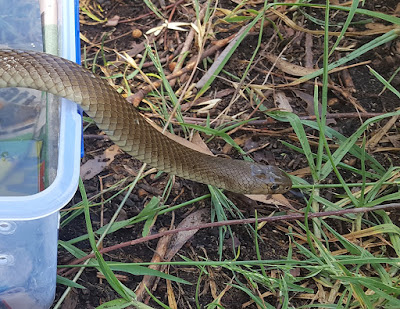Written by
Australian Dog Lover
15:17:00
-
0
Comments
 |
Mark Pelley (a.k.a. The Snake Hunter) kindly shared his insights with us: “In the summer of 2016/2017, more dogs were bitten and killed by snakes than any other snake season I’ve experienced.”
With sprawling housing development occurring in many cities, snake numbers are increasing in the suburbs. “While it is possible for dogs to be bitten in local parks or while exploring near bodies of water, pets are more likely to be bitten in and around their own home especially in suburban environments.”
With the early onset of warmer conditions, snakes are more likely to be discovered while in search of food, water or shelter to better thermoregulate (manage their body temperatures).
With sprawling housing development occurring in many cities, snake numbers are increasing in the suburbs. “While it is possible for dogs to be bitten in local parks or while exploring near bodies of water, pets are more likely to be bitten in and around their own home especially in suburban environments.”
With the early onset of warmer conditions, snakes are more likely to be discovered while in search of food, water or shelter to better thermoregulate (manage their body temperatures).
 |
| Tiger snake - Photo: Sunita Hunt / Gavin Drench |
Mark gives us a timely warning “Often snakes are found when moving objects that the snake was hiding in. Snakes can be active at different times of the day or night, depending upon the species of snake.
In addition, some venomous snakes thrive in colder climates such as the Tiger snake or Copperhead. "I captured a large alive lowland copperhead snake just outside of Melbourne, it was hiding inside the family firewood storage. As such, I have rescued family pets from snakes at all hours and in all seasons, so it is important dog owners remain always vigilant.” says Mark.
What precautions can you take to avoid snake encounters?
Armed with curiosity and natural hunting instincts it is not uncommon for our four-legged friends to cross paths with a snake.
Most snakes will try to avoid you by hiding or running away.
While humans may simply walk away when you encounter a snake, dogs and cats will often be curious or defensive (especially at home) and harass the snake until it gets bitten as a result so here are some basic precautions you can take...
#1. Safety Tips at Home
Keep your backyard tidy by clearing undergrowth, filling holes in the ground, mowing the lawn regularly, and clearing away toys and tools which all make great hiding places for snakes. Keep walkways clear of brush, flowers and shrubs.
Clean up any spilled food, fruit or bird seed, which can attract rodents and therefore snakes. Store any firewood away from the house. The Snake Hunter reminds us that “no matter how clean and tidy the home and backyard are, there are always opportunities for snakes to enter and stay in your property. The above activities help owners see snakes in their property so that they can keep people and pets away from snakes.”
Do not be misled by many of the “myths” about snakes. Snakes can operate at any time of day or night and can be found in all seasons. Snakes do not run away from sound or vibration and they can easily enter the home or backyard. With regards to “snake prevention devices”, Mark explains: “I have caught almost every endemic species of snakes in homes and businesses that deploy ‘snake repellents’ and ‘snake proof fencing’. I have never seen any effective snake-proof device yet.”
 |
| Death Adder - Credit: The Snake Hunter |
Do not let your dog examine dead snakes as they still have venomous fangs. Also, the snake may not be dead. Some snakes can stay extremely still even when danger is nearby (such as the death adder).
Do not attempt to kill or capture a snake! Not only is this extremely dangerous to you, snakes are also a protected species by law.
To learn more about snakes, check our handy ID chart of the Top 5 Venomous Snakes in Australia.
#2. Safety Tips When Outside the Home
Obedience train your dog as much as you can, so he/she has excellent recall and listens to you. Mark works with a local dog trainer and emphasizes: “If there is a confrontation between your dog and a snake, you want to make sure that you dog will return to you if called away or otherwise will listen and not go near a snake.”
Walk your dog on a lead or ensure your dog won’t leave your side when going for a walk. There is less chance your dog will be bitten if your dog is beside you the whole time.
Do not let your dog dog explore holes or dig under rocks or logs and keep away from high grass and rocks where snakes like to rest. Dogs are inquisitive by nature so keep them under close supervision.
What actually happens when a dog is bitten by a snake?
When a snake bites an animal, it injects venom via the fangs into the tissue below the skin. Venom is rapidly absorbed from the site of the bite and carried by the lymphatic system into the animal’s circulation.
Snake venom carries a large range of different toxins that damage tissues and impair many of the body’s vital functions. These can attack the nervous system, cause significant pain, interfere with the body’s natural clotting mechanisms, cause organ damage, paralyze the dog or interfere with breathing and more.
Common Signs and Symptoms of a Snake Bite
- Weakness or severe lethargy Collapse
- Shaking or twitching
- Dilated pupils or difficulty blinking
- Vomiting
- Loss of bladder or bowel control
- Blood in urine
- Ataxia (loss of function of body movements) which could be seen as difficulty walking
- Breathing difficulties (rapid and shallow)
- Excessive salivation (drooling)
- Bleeding from snake bite wound
- Paralysis or Collapse
- Coma or death
How do you identify a snake and what should you do?
Never try to identify a snake that bit your dog. While there is no harm in taking a guess when telling the vet, you could put yourself or your dog at greater risk by trying to get close to a snake to identify it.
 |
| Eastern Brown Snake - Photo: The Snake Hunter |
If you see a snake, or one has bitten your dog, immediately call a snake catcher to your property and get your dog to a vet”.
Having also dealt with many owners whose dogs were bitten by snakes, Mark also suggests the following:
- Most importantly, keep calm yourself and control your own emotions.
- Keep your dog still and calm as possible and reduce stimulus around him.
- Remove people who will make the situation worse.
- Do NOT wash the wound; Do NOT apply a tourniquet, Do NOT apply ice or alcohol or bleed the wound. These approaches do not work and you are just wasting time.
- NEVER try to catch or kill the snake yourself.
- If you can SAFELY get a photo of the snake, then do so, otherwise leave it.
1. Call your closest snake catcher to come and remove the snake.
2. Call the vet to advise of what has happened and take your dog to the Vet ASAP. The quicker you do this, the more chance of survival!
3. If you can describe the snake to the vet do so EXACTLY as you saw it, otherwise do NOT make up information.
Please note that individual species can vary in colour and pattern significantly and only qualified persons can identify snakes with certainty.
What treatment will your dog receive?
Once you arrive, the vet will assess your dog. Most people do not know what type of snake bit their dog so a broad spectrum antivenom is administered and is usually very effective.

Multiple vials are usually given and it is likely your dog will also need intravenous fluids and oxygen. Remember your dog may be in pain and become extremely defensive and display more aggression or a different behaviour than usual. Recovery in the vet clinic can typically take up to a few days but in more serious cases, your dog may need to remain at the vet clinic for weeks.
Pet insurance is recommended as the cost of treating a snake bite can be very high. Mark has seen the costs of treating dogs typically between $4000 - $8000 during this year.
How long could the recovery take?
Prognosis can range from extremely guarded to good depending on the speed of treatment being started, the amount of venom injected and the location of the bite site. Your vet will be able to give you a more accurate answer as to how they think your dog will be after treatment.
Keep in mind that there could be ongoing effects of the venom long after treatment. Mark reported of two cases recently where the dog died months later from the effects the snake venom had on the destruction of the dog’s internal organs.
Please note also that if your pet is given antivenene for a snake bite, it is only being used to neutralise the snake venom in your pet's system at that time. It does not protect your pet in future from further envenomation from a snake. Antivenene is not a vaccination or a preventative medication.
"I have found snakes anywhere you can imagine and would be afraid to imagine in the home, office, garages, businesses etc. But one of the "most interesting times" I caught a snake was the following...
A man was driving in a late model Commodore from a country town to visit his daughter in the city. During the drive, while on the freeway, he noticed in his peripheral vision something moving on the floor. Carefully looking down while driving there was a red-bellied black snake crawling between his legs towards the front of the car. The snake then slithered between the floor of the car and up inside the dashboard area and the man drove the remainder of the journey to his daughter’s house.
 |
| Red-bellied Black Snake |
found a country mechanic to attend. After several painstaking hours of pulling the dash apart, the mechanic suddenly launched out of the car and I realised it was time for me to spring into action!
I eventually pulled the snake out of an opening at the top of the dashboard, securing it inside one of my snake tubs. The man was grateful that the snake was gone but now he and the mechanic had several hours more of putting that car back together!"
 Mark Pelley (The Snake Hunter) is based in Diamond Creek, Victoria where he catches more venomous snakes in people’s homes, cars and backyards each year that you would dare to imagine.
Mark Pelley (The Snake Hunter) is based in Diamond Creek, Victoria where he catches more venomous snakes in people’s homes, cars and backyards each year that you would dare to imagine.
Trained in handling snakes in both Australia and Pakistan, he is well known for running towards a striking and threatening snake when others turn in the opposite direction! As the Snake Hunter, Mark also provides reptile shows for events, consultation for government and private businesses on how any situation that has to deal with snakes. He goes to schools and educates migrant communities to help people better understand how to respect and value Australia’s natural biodiversity.
To learn more, please visit www.snakehunter.com.au or follow @SnakeHunterAus on Facebook
 Mark Pelley (The Snake Hunter) is based in Diamond Creek, Victoria where he catches more venomous snakes in people’s homes, cars and backyards each year that you would dare to imagine.
Mark Pelley (The Snake Hunter) is based in Diamond Creek, Victoria where he catches more venomous snakes in people’s homes, cars and backyards each year that you would dare to imagine. Trained in handling snakes in both Australia and Pakistan, he is well known for running towards a striking and threatening snake when others turn in the opposite direction! As the Snake Hunter, Mark also provides reptile shows for events, consultation for government and private businesses on how any situation that has to deal with snakes. He goes to schools and educates migrant communities to help people better understand how to respect and value Australia’s natural biodiversity.
To learn more, please visit www.snakehunter.com.au or follow @SnakeHunterAus on Facebook
Lead image: Star (dog) and Nyoka (woma python kept as a pet) - Credit: The Snake Hunter
Related Topics:









No comments
Post a Comment